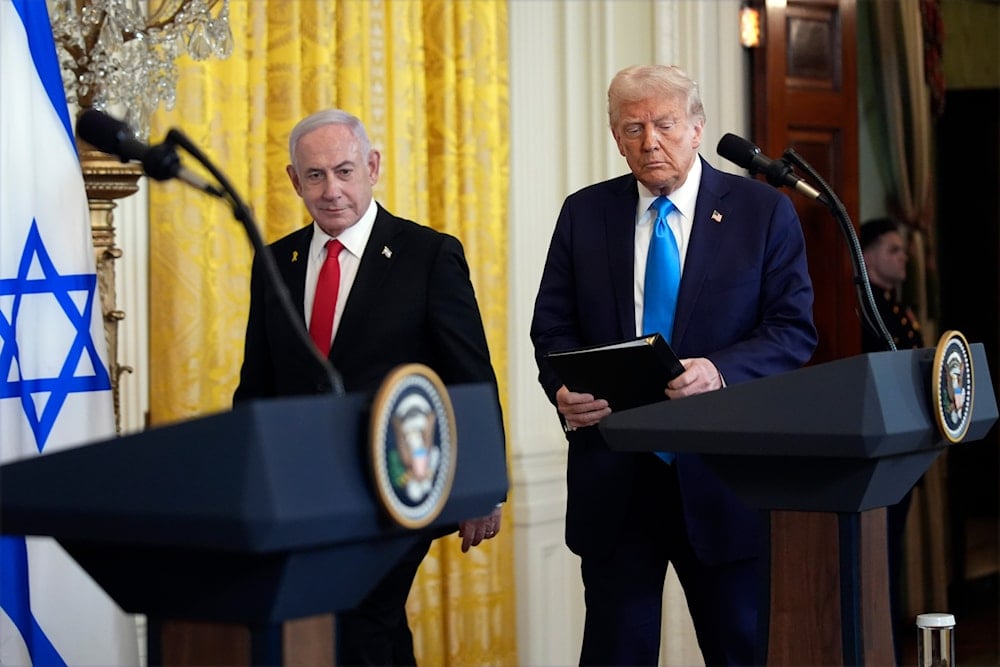Trump promotes ethnic cleansing of Palestinians via 'take over' plot
Trump expanded on his plans for permanently displacing Palestinians, his Iran policy, and normalization in the Middle East, during a press conference with Netanyahu.
-

United States President Donald Trump, right, and Israeli Prime Minister Benjamin Netanyahu, left, arrive for a news conference in the East Room of the White House, on February 4, 2025. (AP)
United States President Donald Trump pushed for Washignton's "take over" of the Gaza Strip, during a joint news conference held with Israeli Prime Minister Benjamin Netanyahu.
"The US will take over the Gaza Strip and we will do a job with it, too. We'll own it. And be responsible for dismantling all of the dangerous unexploded bombs and other weapons on this site," Trump said.
Plot for ethnic cleansing via urban development
Although Trump’s rhetoric was blunt, the idea of forcibly displacing Palestinians from their homeland has been a recurring theme in Israeli discourse since the establishment of the occupation. Often referred to with terminology like "transfer" or "incentivized immigration," these terms have long served as a facade for what is, in effect, ethnic cleansing. The strategy has relied on making life in the occupied territories increasingly intolerable, pushing millions of Palestinians into permanent displacement under the guise of voluntary relocation.
Now, Trump sets his sights on the ravaged Palestinian territories for a new urban development project, a plan that, if realized, would result in the forced displacement of hundreds of thousands of Palestinians.
Meanwhile, a smug Netanyahu said that Trump's plan for the US to take control of the Gaza Strip would "change history." The Israeli prime minister said, "It's worth paying attention to" Trump's ideas on Gaza.
The US president further explained that he expected the US to take "long-term ownership" of the Gaza Strip, saying that it would create "thousands of jobs" in the region. He also called for the displacement of Palestinians outside the Gaza Strip, after previously suggesting that they be housed in Egypt and Jordan on a permanent basis.
He said that he would not allow for "the rebuilding and occupation" of Gaza by the same people, instead floating the idea of a US takeover of the besieged territory.
"It should not go through a process of rebuilding and occupation by the same people that have really stood there and fought for it and lived there and died there and lived a miserable existence there," he said.
"I do see a long-term ownership position, and I see it bringing great stability to that part of the Middle East and maybe the entire Middle East," Trump told reporters.
"This was not a decision made lightly, everybody I've spoken to loves the idea of the United States owning that piece of land," he boasted.
The US president even went as far as saying that the Gaza Strip could become "the Riviera of the Middle East."
Despite regional governments, parties, and Palestinians rejecting the displacement of Palestinians Trump continued to tout the idea, making it the focal point of Tuesday's meeting with Netanyahu.
Read more: 'Palestinians have no alternative' but to leave Gaza, Trump says
The greatest friend 'Israel' has had
Netanyahu also spoke at the conference, dedicating a substantial portion of his speech to praise Trump for supporting his regime.
"You are the greatest friend Israel has ever had in the White House," Netanyahu told Trump.
The Israeli prime minister celebrated multiple decisions made by Trump during both terms of his presidency. This ranged from Washington's recognition of Israeli sovereignty over the occupied Syrian Golan Heights, the relocation of the US embassy to occupied al-Quds, launching the "Abraham Accords" for normalization with Arab governments, and the freeing up of munitions deliveries to the Israeli regime.
Normalization with Saudi Arabia
Reporters also asked the two officials about the status of normalization talks with Saudi Arabia.
"I think peace between Israel and Saudi Arabia is not only feasible, I think it's going to happen," Netanyahu said. Just earlier, Trump and Netanyahu had addressed the media as the Israeli prime minister arrived at the White House, where Trump had claimed that Saudi Arabia does not want a Palestinian state.
Although the establishment of an independent Palestinian state has been a key condition of Saudi officials during talks, Trump seemingly dismissed these demands. However, when questioned later by reporters over the issue, both refrained from reaffirming Trump's previous statement, leaving the issue unresolved.
Soon after, the Saudi Foreign Ministry released a statement reaffirming its demands for an independent Palestinian state, adding that it rejects all attempts for the displacement of Palestinians from their homeland.
Read more: No Israeli pledge to accept Palestine State in Saudi talks: Dermer
Most aggressive sanctions against Iran
On Iran, Trump reaffirmed his commitment to enforcing the "most aggressive" sanctions on Iran, a move he argues is necessary to limit Iran’s nuclear ambitions. Trump applauded his own decision to withdraw from the Iran nuclear deal, saying that it was the "worst deal."
He said that the renewed sanctions aim to drive Iranian oil exports to zero and reduce Tehran's ability to support liberation movements.
Yet, Trump left the possibility for diplomatic negotiations open, stating that he was "unhappy" about reinstating sanctions on Iran. He emphasized that his primary concern was ensuring Iran never develops nuclear weapons.
" I hated to do it, just so you understand. And I hope we’re going to be able to do something so that it doesn’t end up in a very catastrophic situation. I don’t want to see that happen," Trump said.
Read more: Trump shelves 'Israel' plans to attack Iran, Maariv reports

 5 Min Read
5 Min Read








